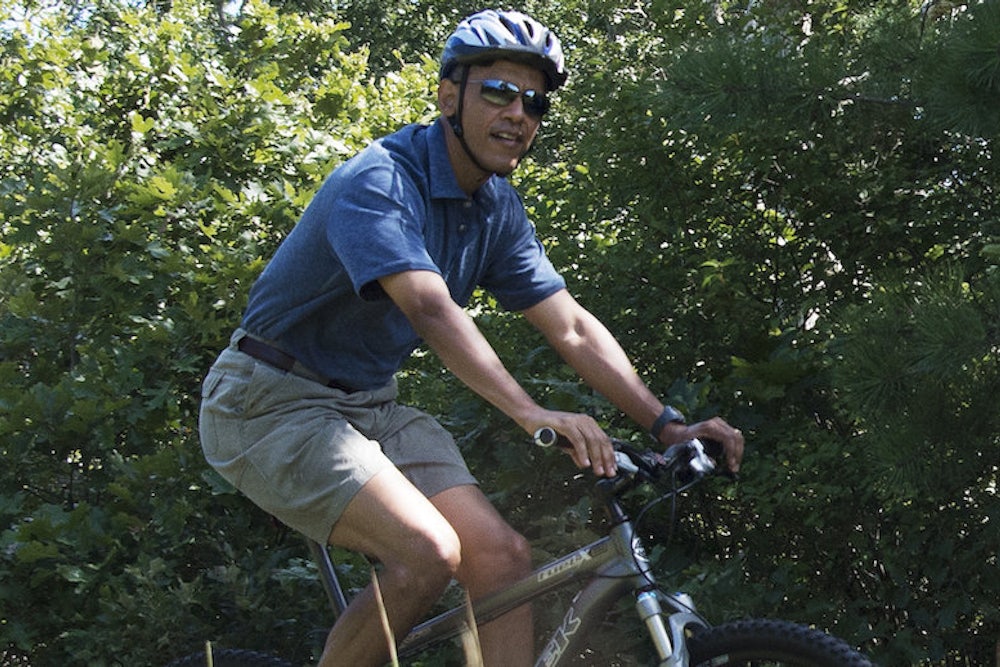President Barack Obama kept environmentalists busy and Republicans furious in 2014. He delivered a climate deal with China, pledged $3 billion to international climate finance, tackled the largest source of this country's carbon pollution, and handed down regulations on smog—and those are just the highlights.
Can Obama top this in 2015? The administration's main test next year will be defending his legacy under a Republican-controlled Congress. But it's also Obama's last chance to tackle issues that haven’t been top priorities in the first six years of his tenure.
Here are the top five hopes of environmentalists heading into next year:
1. Designate national monuments.
Until this year, even President George W. Bush's record on public lands looked good compared to Obama's. In his first term, Obama leased twice as much land for oil and gas drilling than he's set aside for protection.

More recently, he's picked up the pace by announcing this summer the creation of the largest marine sanctuary in the Pacific Remote Islands. Congress this month conserved 1 million acres of land in its defense spending bill (though it also happened to give loggers and miners new access to other areas). But Obama doesn't have to wait for Congress to approve new monuments because his own power to designate lands and waters is well-established under the Antiquities Act. Just last week, Obama protected Bristol Bay in Alaska from oil and gas drilling. "What he’s done thus far is smaller lands, smaller acreage, and historical areas," Sierra Club legislative director Melinda Pierce said. "We’d like to see a more comprehensive initiative."
2. Crack down on illegal fishing.
World Wildlife Fund marine policy expert Michele Kuruc says that in her 30 years of work, she hasn't seen a president take the issue of illegal fishing seriously. Kuruc hopes 2015 is the year that changes. Almost all seafood consumed in the U.S. is imported, but up to 30 percent of wild-caught fish are illegally fished. Federal regulators don't adequately track what's coming in, how it's caught, and where it's from. Obama’s called for a national strategy, and once new regulations are finalized, it could mean much better labeling and tracking of seafood. A U.S. crackdown on the black market would go a long way to protecting the oceans from overfishing, maintaining biodiversity, and protecting people's livelihoods from organized crime. Kuruc says "being timely is important. This is an urgent action that needs to be finalized, with no loose ends, and no question about whether it would be implemented or not."
3. Deliver a methane strategy.
In January, the Environmental Protection Agency is supposed to announce its strategy for how it will reduce methane emissions from the oil and gas sector. Natural gas is mostly made up of methane, but when it escapes into the atmosphere, it becomes a potent source of greenhouse gas emissions. EPA Administrator Gina McCarthy suggested the strategy "will see both regulatory actions, as well as significant opportunities for voluntary action" from the industry. Environmentalists have urged McCarthy to use the same legal authority on methane that it uses to regulate carbon pollution from power plants. Obama "could regulate emissions from methane using the same Section 111D of the Clean Air Act. It's a process whereby existing infrastructure and states would come in to the EPA and say here’s how we intend to meet the standard," Environmental Defense Fund's Senior Director for Strategic Planning Elgie Holstein said. This is the final, important step to completing Obama's promise to world leaders that the U.S. will reduce its greenhouse gas emissions 17 percent over 2005 levels by 2020. Cutting carbon pollution from power plants will only get the U.S. so far toward this goal, and methane, depending on what the administration chooses, can finish the job.
4. Veto the Keystone XL pipeline.
A veto of the long-embattled pipeline would be a conclusive, if symbolic victory for the climate movement. Diving oil prices and economic factors may render the decision irrelevant, and pipeline owner TransCanada is pursuing alternative routes to transport oil from the tar sands to refineries on the coast. Still, a veto, which would likely only come after the Nebraska Supreme Court rules in a case about the pipeline traversing the state, would send a signal about where America's climate change priorities lie. Lately, Obama's dropped a few hints he might veto the long-embattled pipeline. In November, he did a good job summarizing the arguments against approval. "Understand what this project is: It is providing the ability of Canada to pump their oil, send it through our land, down to the Gulf, where it will be sold everywhere else," he said. "It doesn't have an impact on U.S. gas prices." At his year-end press conference, he said the pipeline would only create a "couple thousand" jobs, and that "there are a lot more direct ways to create well-paying American construction jobs."
5. Defend his legacy.
It's important that Obama preserve his environmental achievements from 2014. A number of issues will be finalized in the coming year, including EPA rules regulating water and curbing carbon pollution for existing and new power plants. "A number of clean air and clean water regulations will cross the finish line next year,” Pierce said. “That’s why they will feel more significant, because they hit the books, but it really is a long process." To do what Obama promised on climate, the EPA can't weaken its plans. The regulations will have to survive the coal industry's court battles, and a Congress intent on derailing them.
